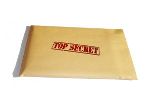Market Opportunity: Unforwardable Emails
 I’ve seen a number of news items over the past few years in which internal firm or law school emails get leaked to online legal gossip sites, to the embarrassment of the originating institution. In my view, the frequency with which this occurs indicates a world in transition. Once, there were no online gossip sites worth worrying about, and firm memoranda about salaries, scandals, employment issues, or stolen lunches from the office refrigerator rarely made it past the walls of the institution. Now, there are such sites, and salacious and even mundane internal correspondence regularly leaks to them. This strikes me as a situation that can’t persist in its current form much longer. Either practices will change (i.e., no more emails about firm policies) or some sort of restrictions will be put in place. (A third option, that expectations of confidentiality concerning such matters will evaporate, strikes me as unlikely.)
I’ve seen a number of news items over the past few years in which internal firm or law school emails get leaked to online legal gossip sites, to the embarrassment of the originating institution. In my view, the frequency with which this occurs indicates a world in transition. Once, there were no online gossip sites worth worrying about, and firm memoranda about salaries, scandals, employment issues, or stolen lunches from the office refrigerator rarely made it past the walls of the institution. Now, there are such sites, and salacious and even mundane internal correspondence regularly leaks to them. This strikes me as a situation that can’t persist in its current form much longer. Either practices will change (i.e., no more emails about firm policies) or some sort of restrictions will be put in place. (A third option, that expectations of confidentiality concerning such matters will evaporate, strikes me as unlikely.)
The latest item to set off this thought in my head was this news item from the Wall Street Journal’s Law Blog (essentially a slightly more tony version of Above the Law). As I tell my Internet Law students, there are various ways of controlling a behavior such as forwarding emails. Law is one way, but not a likely one in this case. Informal social norms are another (“Give a hoot! Don’t redistribute!”). That seems unlikely here, too. But a third is some sort of technological solution. And here, I would think a technological solution is at least conceivable: an office network that offers, as an option, blocking redistribution of the content of certain emails.

 No. 527: Photos from that time the Chicago transit engineer
No. 527: Photos from that time the Chicago transit engineer